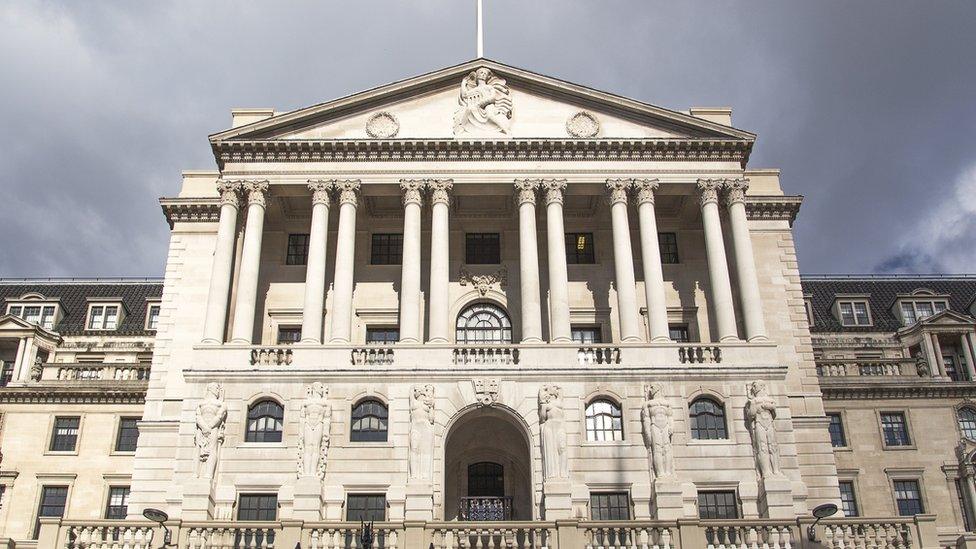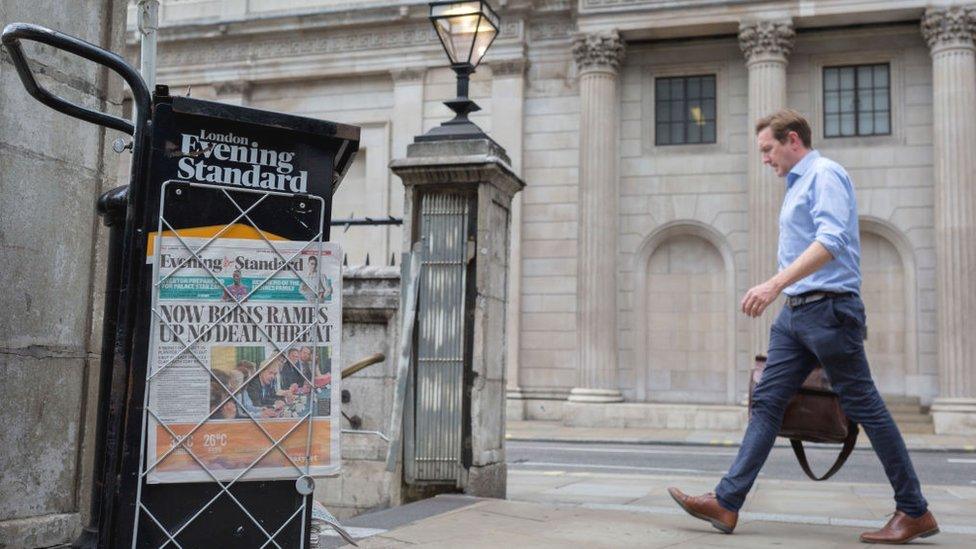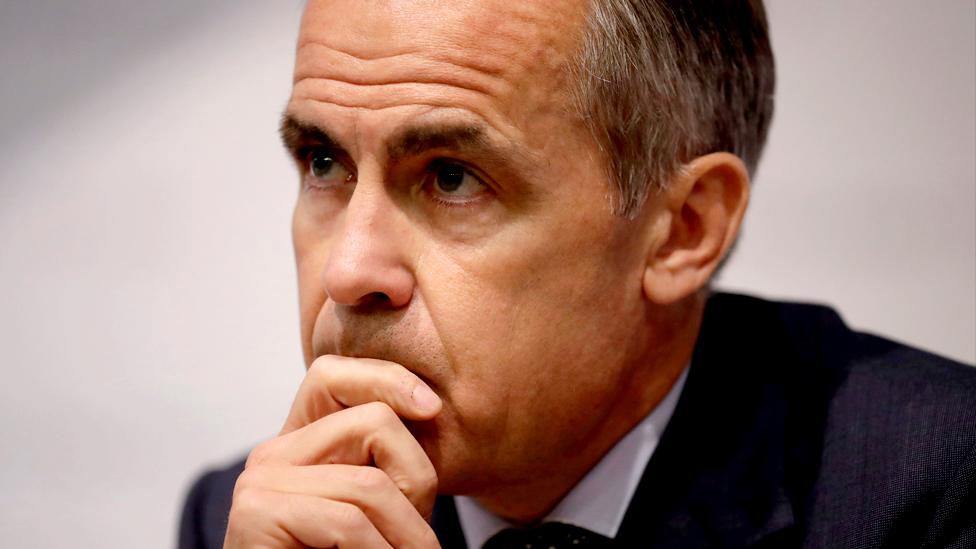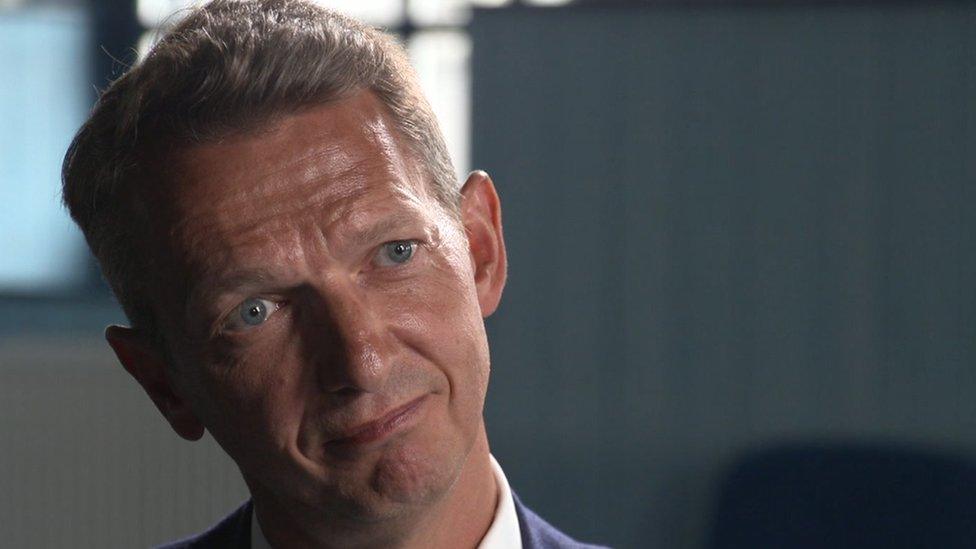Bank struggling to see through the Brexit fog
- Published

The Bank's boffins have had to continue to assume that there will be a smooth Brexit, as that, officially, is the government's policy.
On that basis, growth is down over the next two years and inflation a touch higher. Between April and May, the Bank now believes that the British economy stalled.
The quarterly GDP figure for the second quarter of 2019 is now predicted to be 0, rather than the 0.2% predicted at the last economic forecast in May. But it does not then anticipate a sharp rebound in the current quarter - growth is forecast in the third quarter at 0.3%.
Taken together, the Bank now believes that PM Boris Johnson has inherited an economy not in recession, but in the middle of a weak six-month stretch in growth. Now, some of that is down to "volatile" UK data.
Stockpiling boosted the economy in the first quarter, but that will more than reverse. The shutdowns in car factories around no-deal Brexit plans for March also dragged on the economy, but should at least partially bounce back around now.
But the bigger picture is that the Bank has amassed evidence that businesses small and large now believe that Brexit uncertainty, over ongoing trading arrangements with the EU, is bigger in size and longer-lasting than three months ago.
Alongside slower global growth, this has hit business investment and therefore underlying growth too.
High chance of recession
There is now a one-in-three chance, the Bank calculates, of an annual contraction in growth by early next year, which almost certainly signals a recession - the highest since immediately after the referendum.
However, the entire exercise is "affected by an inconsistency", acknowledges the Bank. While it has chosen to forecast a smooth Brexit, since Theresa May failed to pass her withdrawal deal, markets have been increasingly pricing in the chances of a leaving the EU without a deal.

There are increasing fears that the UK will leave the EU without a deal
Some markets see a 40% chance of no-deal. It can be seen in the sterling slide most obviously, but also in trading of UK government debt, which now presumes the Bank will cut, rather than raise interest rates, by next year.
But the Bank did not choose to outline the detailed implications of what is widely seen as an increasingly likely outcome.
In the minutes of the Monetary Policy Committee, there is some verbal acknowledgement that: "In the event of a no-deal Brexit, the sterling exchange rate would probably fall, CPI inflation rise and GDP growth slow". But no numbers, at this, the last formal forecasting opportunity before the new Brexit due date of 31 October.
Lower sterling will lead to higher inflation above the Bank's target of 2%, but not all of the 7% recent fall is included in this latest forecast.
What will happen next?
Inflation rises are also tempered by the government's energy price cap, the Bank says. There was also a repeat of the warning not to presume that the Bank of England would inevitably cut rates following a no-deal.
The response to Brexit is "whatever form it takes, will not be automatic and could be in either direction".
So the message from the Old Lady is don't presume, and don't assume.
Predicting the path of the economy through the political machinations of a possible no-deal Brexit is akin to driving with an iced-up windscreen and a broken sat-nav.
For now, the Bank has pulled up in a lay-by, got out of the car, and is awaiting a clearer indication of factors it cannot control.
There is a weather vane at the top of the Bank of England's centuries-old headquarters in Threadneedle Street that used to provide some early indication of when the winds were appropriate for the arrival of trading ships on the Thames in the need of its funds.
So thick is the Brexit fog in their attempts to assess the path for the economy, that the vane may well offer more clarity.
Either way, no change to monetary policy at this meeting, and little clarity on where it goes from here.
- Published1 August 2019

- Published31 July 2019

- Published22 July 2019

